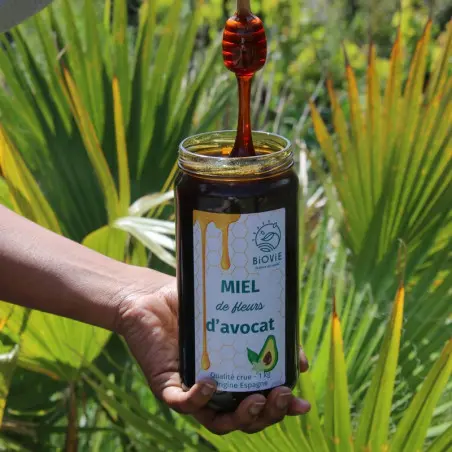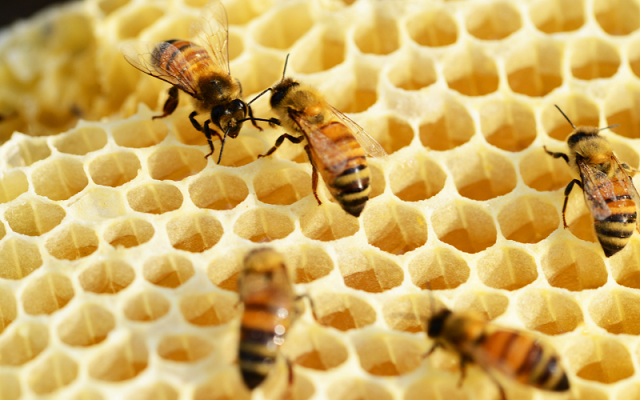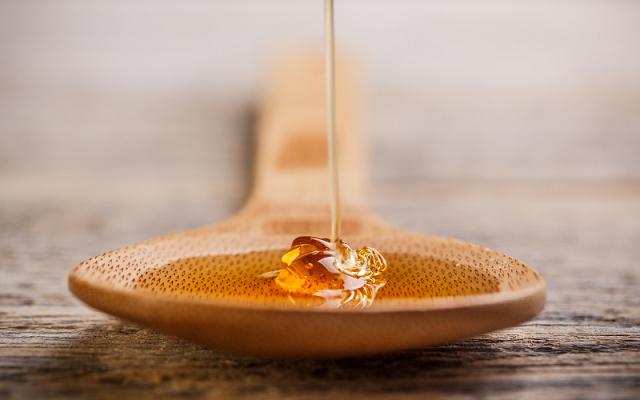Le (The) honey It is this sweet treasure produced by bees. For millennia, honey has been highly valued for its delicious sweetness and culinary versatility, but that's not all! It is a treasure of nature because it has numerous benefits for human health and well-being, and this has been known since ancient times. This liquid gold possesses medicinal and nutritional properties that modern science continues to prove to this day, confirming its multiple virtues.
Civilizations such as the Egyptians, Greeks, Romans, Chinese, and Indians once used honey not only as a staple food but also as a natural remedy for many ailments, ranging from intestinal diseases to skin care.
In this article, we will explore in detail the numerous health benefits of honey, highlighting its nutritional properties as well as its various uses, while also addressing the controversies and concerns surrounding honey.
Discovery of Honey: Origin and Varieties
The discovery of honey dates back to time immemorial. The earliest traces of honey consumption go back a long way, as there are cave paintings that show men harvesting wild honey. This nectar of the bees has played a role in several civilizations, notably Egyptian, Roman, Greek, and Chinese, where honey was used as a a precious and versatile food, serving asSweetener in the kitchen, of medicinal remedy In traditional medicine and religious symbol "in the rituals."
Honey is produced by bees from the nectar of flowers.
First, the worker bees collect the nectar and store it in their crop, which is a pouch located in their stomach. Upon returning to the hive, they regurgitate the nectar stored in their crop and pass it mouth-to-mouth to other worker bees. This process allows for the addition of other digestive enzymes to break down the complex sugars in the nectar into simple sugars. This nectar is then stored in the hive's cells, where it is subsequently dehydrated and sealed with beeswax. This delicate process of honey production makes it a true marvel of nature.
It is estimated that there are more than 300 types of honey in the world. Among the most well-known varieties are linden honey, lavender honey, fir honey, orange blossom honey, and avocado honey, ... manuka honey... Each variety of honey offers a unique taste experience, influenced by the plants from which the nectar is sourced.
Nutritional properties of honey
Honey is much more than a natural sweetener; this golden sweetness is packed with essential nutrients and beneficial compounds for health. Its nutritional composition can vary slightly depending on the type of honey, its floral source, and its processing. Here is the typical nutritional composition of honey:
- Carbohydrates: Honey is primarily composed of carbohydrates, making up about 80 to 90% of its total composition. It mainly consists of glucose and fructose, two types of natural sugars that provide quick energy to the body.
- Water: Honey also contains a variable amount of water, ranging from 14 to 20%, depending on its variety and degree of maturity.
- Vitamins: Honey contains essential vitamins such as B-group vitamins, including niacin, riboflavin, and pantothenic acid, as well as vitamins C, D, and E, although the quantities may vary depending on the variety of honey.
- Minerals: This bee liqueur is a natural source of minerals such as calcium, potassium, magnesium, phosphorus, sodium, zinc, and iron, which contribute to various biological processes in the body.
- Amino acids: Honey contains a very small amount of amino acids, which are the building blocks of proteins.
- Enzymes: Honey contains various enzymes, such as glucose oxidase, which improve digestion and contribute to its flavor, texture, and antibacterial properties.
- Antioxidants: This sweet delight is rich in flavonoids and phenolic compounds, which help neutralize free radicals and protect cells against oxidative damage.
Compared to other natural sweeteners such as maple syrup, agave syrup, fruit sugar, or coconut sugar, honey offers additional and beneficial health advantages, making it a popular choice for those looking to adopt a healthy and balanced diet.
The main health benefits of honey
Honey is a true treasure of health benefits, thanks to its numerous medicinal and nutritional properties that it provides to our body. Here are some of its main health properties:
1- Antibacterial and healing properties:
Honey has antibacterial properties, as well as antiseptic and healing virtues. A study It has been shown that thanks to the various components of honey, the growth of pathogenic bacteria is inhibited, in addition to a synergistic effect when it is applied with antibiotics.
Honey can also inhibit the growth of antibiotic-resistant strains and is effective in treating wounds and burns, thereby promoting healing.
2- Antioxidant effect:
Honey is considered an excellent antioxidant because it is rich in flavonoids, polyphenols, and phenolic acids. These compounds have the ability to neutralize free radicals in the body and reduce oxidative stress. A study revealed that even though antioxidant activity is still present in honey, significant differences in the amount of this activity are observed, and this is due to the difference in the variety of flower chosen by the bee and its geography.
The presence of antioxidant activity in honey can reduce the risk of chronic diseases such as heart disease and cancer.
3- Relief of cough and sore throat:
Honey is often considered a traditional remedy for relieving coughs and sore throats. This natural remedy, used since our childhood and still found in our pantry as adults, manages to heal us every time thanks to its viscous texture, which creates a protective coating in the throat, reducing irritation and thus promoting healing.
4- Improvement of digestive health:
Honey can help promote digestive health because scientific research have shown that it can act as a natural prebiotic, because it can reduce the presence of bacteria responsible for infections in the intestine while promoting the growth of beneficial species for the gut flora.
5- Neuroprotective properties:
Honey possesses neuroprotective properties that improve brain health. It has sparked the interest of scientists and studies have proven that thanks to its antioxidant properties, and more specifically due to its high levels of polyphenols, quercetin, and gallic acid, honey could have a positive effect on Alzheimer's and Parkinson's diseases.
6- Skincare:
Honey has a healing effect on the skin due to its antibacterial properties, but it can also be used as an ingredient in skincare products because of its moisturizing properties. It can also help soothe irritated skin, treat acne problems, and promote healthy, glowing skin.
Controversies and concerns surrounding honey
Although honey is widely appreciated for its various health benefits, there are some controversies and concerns surrounding its consumption and production. This natural syrup can be contaminated by pesticide residues and other chemicals from plants treated by farmers. These contaminants can compromise human health and the quality of the honey.
There is also The commercial production of honey can have a negative impact on bee populations due to intensive agricultural practices, habitat loss, and exposure to pesticides. Its production can also have an impact on the environment, as deforestation and the reduction of wild areas decrease the available food sources for bees.
Regarding the authenticity and quality of this sweet delight, the honey market can sometimes face issues of counterfeiting and adulteration by selling inferior quality honey. Some dishonest producers dilute honey with sugar syrup or add artificial sweeteners to increase volume and reduce production costs. These practices can deceive consumers and undermine their trust in the product, damaging the reputation of the beekeeping industry as a whole.
In this context, we would like to emphasize that our avocado honey from Spain It seems like your text is incomplete. Could you please provide the full text you would like translated from French to English?"Derived from artisanal beekeeping practices, respectful of the environment and sustainable." Each jar of honey we produce is the result of a meticulous process, without the use of pesticides harmful to the health of our valued consumers.
You will be able to rediscover the powerful taste of dark honey while enjoying its authentic health benefits.You can have complete confidence in the quality and integrity of our 100% raw and natural honey, while supporting beekeeping practices that preserve our environment for future generations.
Culinary and medicinal uses of honey
Honey is a versatile ingredient; it has its place both in cooking and in traditional medicine.
Culinary uses:
- This sweet delight is widely used as natural alternative to sugar in a wide variety of recipes.
- Its sweet taste and viscous texture make honey an excellent sweetener for hot drinks like tea and coffee, as well as for the cereals and the yogurts.
- Honey can be used as a sweet base for making jams, jellies, and fruit pastes, thereby adding a rich flavor and a smooth texture.
Medicinal uses:
- As we mentioned earlier, honey is used as a natural remedy for relieve the cough and soothe the sore throat. A spoonful of honey in a cup of tea or hot water is enough to help soothe the symptoms of the flu and cold.
- Honey has been used for centuries for promote wound healing through its antimicrobial and anti-inflammatory properties. .
- He can promote healthy digestion by helping to regulate bowel movements as it acts as a natural prebiotic...by promoting the growth of good bacteria in the gut and supporting intestinal health.
- Honey is used in many skincare products as a natural moisturizer.
Conclusion
Finally, honey turns out to be much more than just a simple natural sweetener ! It possesses unique nutritional properties and exceptional benefits for the body as it is considered an antioxidant, antimicrobial, and antiseptic all at once.. Its medicinal virtues make it a valuable ally for health, while its viscous texture and delicious taste make it a versatile ingredient in cooking, capable of transforming any recipe.
However, it is important to remember that there are controversies and concerns related to the production and consumption of honey.
Nevertheless, these challenges have not diminished its popularity among those who prioritize a balanced and natural diet as well as holistic personal care. By choosing high-quality honey from reliable sources and consuming it in moderation, we can fully enjoy its numerous health benefits and delicate flavor.















